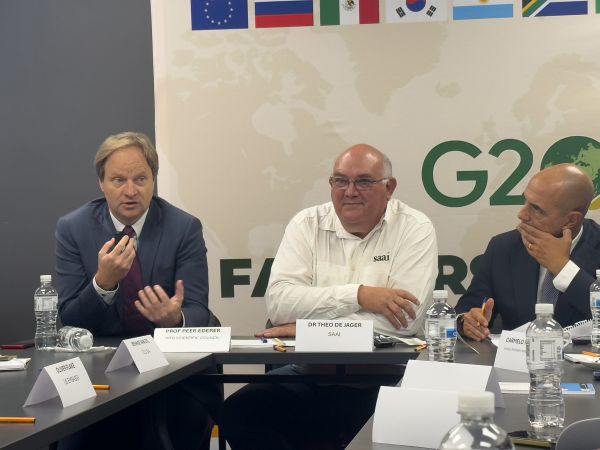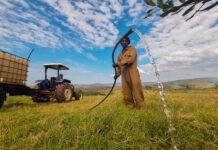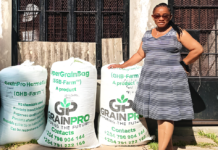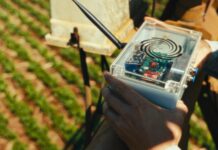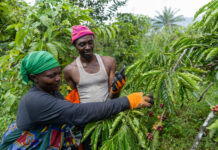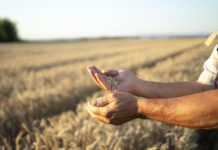The Southern Africa Agricultural Initiative (Saai) hosted the G20 Farmers Dialogue at the Faculty of Agricultural Sciences, Stellenbosch University, bringing together farmer leaders from across the G20 and beyond. The two-hour hybrid event attracted both in-person delegates and digital participants from Europe, North America, Asia, and Africa, ensuring that the authentic voice of farmers was represented in global policy debates.
The Dialogue focused on four central themes: family farming; digitalisation, innovation, and AI; livestock and proteins; and trade and food security. The contributions will form the basis of a farmers’ declaration to be tabled at the G20 Heads of State Summit in Johannesburg in November 2025.
Farmers’ voices from around the world
Opening the session, Ettore Prandini, President of Coldiretti (Italy), emphasised the global significance of family farming, “Family farmers are the pillars of agriculture globally. They produce most of the world’s food, safeguard biodiversity, and sustain rural communities. Without family farmers, there is no food security, no food sovereignty, no peace.”
From the United States, Rob Larew, President of the National Farmers Union (NFU), warned against the growing power of monopolies, “Too often there are too few corporate monopolies that put the independence of family farmers at a big disadvantage. Governments must decide either adopt policies that support independent farmers or accept responsibility for eroding food security and sovereignty.”
Speaking from Canada, Keith Currie, President of the Canadian Federation of Agriculture, highlighted the importance of protecting farmers in the digital era, “Technology is already here, and farmers want to embrace it. But we need governments to ensure transparency and integrity so that farmers’ data is not misused and their independence is safeguarded.”
Representing South Africa, Bennie van Zyl of TLU-SA stressed the local and global value of family farms, “Family farming is the backbone of our rural communities and an indispensable link to global food security. Protecting family farms is not just a local matter – it is a global investment in stability, food security, and sustainability.”
AJ Mthembu, President of Afasa (South Africa), reinforced the importance of indigenous knowledge and resilience, “Family farmers form the basis of food sovereignty. If we lose them, we risk food insecurity on a global scale. Technology must serve to strengthen, not replace, the foundation of family farming.”
Pressures on livestock and proteins
The Dialogue also tackled the future of livestock and animal proteins. Prof. Peer Ederer, Chairman of the WFO Scientific Council, cautioned against misguided policy trends, “Several prominent governments are actively reducing food production and limiting exports of animal-sourced foods, even while the world needs more of it. This is ideology, not science. Animal source foods are nourishing, not dangerous, and livestock farming done right preserves ecological balance.”
Luigi Scordamaglia of Coldiretti (Italy) warned against the corporate capture of alternative proteins, “Lab-grown meat is the opposite of family farming, it concentrates power in the hands of a few multinationals. We must defend transparency in labelling and protect real farmers’ livelihoods.”
Digitalisation and trade
Discussions also covered digitalisation and artificial intelligence. Farmers shared both opportunities and risks:
Prof. Ederer spoke of the power of “engineering trust” through big data to restructure financing and value chains. Delegates from Italy shared how small-scale farms integrated into shared data models to create Europe’s highest added value in agriculture.
On trade and markets, Carmelo Troccoli, Director of the World Farmers Market Coalition, called for stronger local food systems, “It is paradoxical that rural areas where food is produced are often the same areas where food insecurity is highest. Farmers must not only produce – they must also have the right to sell directly and sustain their communities.”
A united message
Across diverse perspectives, a common theme emerged: the urgent need to protect the independence, profitability, and sustainability of family farmers in a rapidly changing global environment.
Dr Theo de Jager, Chairman of Saai, concluded, “Today farmers from all over the world spoke with one voice. In a global food system under pressure from corporatisation, shifting trade regimes, and alternative proteins, family farmers remain the cornerstone of food security and rural life. This Dialogue ensures that the authentic voice of farmers will be heard at the G20 Summit.”


